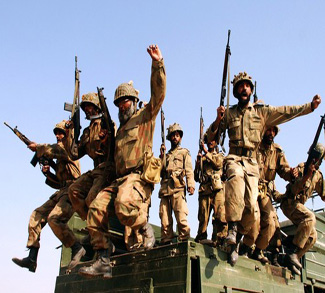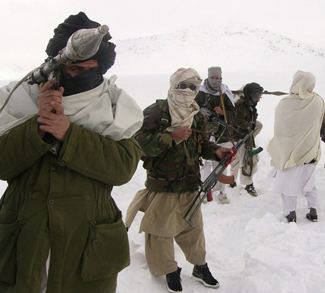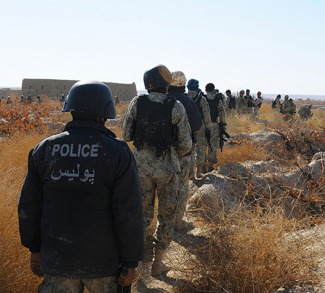Summary
‘Out-of-the-box’ CIA think tank proposes concerns over women’s rights, fear of terrorism as ways to boost support for Afghan war.
Analysis
Evidently spooked by the collapse of the Dutch government over the country’s involvement in Afghanistan, the CIA has put together a strategy proposal to prevent what it fears could be a “precipitous” collapse of support for the war in Afghanistan among European allies.
A document marked “confidential / not for foreign eyes,” posted to the Wikileaks Web site, suggests strategies to manipulate European public opinion on the war, particularly in France and Germany.
The document doesn’t propose any direct methods by which the CIA could achieve this — there are no references to planting propaganda in the press, for example — but it does lay out what it sees as the key talking points to changing hearts and minds on the war. Among its proposals, the policy paper suggests playing up the plight of Afghan women to French audiences, as the French public has shown concern for women’s rights in Afghanistan.
For the German audience, the document suggests a measure of fear-mongering about the possible fallout of NATO failure in Afghanistan. “Germany’s exposure to terrorism, opium, and refugees Read the report here, courtesy of Wikileaks.
The policy paper was prepared by a group called the “CIA Red Cell,” which describes itself as having been tasked “with taking a pronounced ‘out-of-the-box’ approach that will provoke thought and offer an alternative viewpoint on the full range of analytic issues.”
“The fall of the Dutch Government over its troop commitment to Afghanistan demonstrates the fragility of European support for the NATO-led ISAF mission,” the document states. “Some NATO states, notably France and Germany, have counted on public apathy about Afghanistan to increase their contributions to the mission, but indifference might turn into active hostility if spring and summer fighting results in an upsurge in military or Afghan civilian casualties.”
The CIA report notes that 80 percent of the French and German public are opposed to the war, but offers a loophole: Public apathy, which has allowed European leaders to extend and broaden their involvement in Afghanistan despite deep opposition.
But “if some forecasts of a bloody summer in Afghanistan come to pass, passive French and German dislike of their troop presence could turn into active and politically potent hostility,” the report states.
Get Obama Involved
The CIA Red Cell points out that President Obama continues to enjoy popular support in Europe at levels he has not seen in the US in months. The report suggests getting the president involved in selling the Afghanistan war to Europeans.
“The confidence of the French and German publics in President Obama’s ability to handle foreign affairs in general and Afghanistan in particular suggest that they would be receptive to his direct affirmation of their importance to the ISAF mission and sensitive to direct expressions of disappointment in allies who do not help,” the report states.
The report notes that “when [opinion poll] respondents were reminded that President Obama himself had asked for increased deployments to Afghanistan, their support for granting this request increased dramatically, from 4 to 15 percent among French respondents and from 7 to 13 percent among Germans.”
To change French minds, the CIA Red Cell proposes linking the Afghanistan war to the effort to improve women’s rights in Afghanistan. It also proposes pointing out that the Afghanistan mission is more popular in Afghanistan than it is in Europe, at least according to the statistics cited in the report.
“Afghan women could serve as ideal messengers in humanizing the ISAF role in combating the Taliban because of women’s ability to speak personally and credibly about their experiences under the Taliban, their aspirations for the future, and their fears of a Taliban victory,” the report asserts.
“Highlighting Afghans’ broad support for ISAF could underscore the mission’s positive impact on civilians. About two-thirds of Afghans support the presence of ISAF forces in Afghanistan, according to a reliable… poll conducted in December 2009,” the report states.
For the German public, the message should be somewhat different. The report states. “Messages that dramatize the consequences of a NATO defeat for specific German interests could counter the widely held perception that Afghanistan is not Germany’s problem. For example, messages that illustrate how a defeat in Afghanistan could heighten Germany’s exposure to terrorism, opium, and refugees might help to make the war more salient to skeptics.”
Numerous news reports in recent years have suggested that the CIA is more deeply involved in the Afghanistan war than it has been in previous wars. For instance, when news broke that seven CIA agents had been killed in a suicide bombing at a forward operating base, it highlighted the fact that the CIA has been operating essentially as a branch of the military in Afghanistan, running the unmanned aerial drone strikes against the Taliban.
That suicide bombing also highlighted the difficulties the agency faces in getting a grasp on the situation in the Central Asian country. CIA operatives had believed Humam Khalil Abu-Mulal al-Balawi, the suicide bomber, was willing to work as an informant for them. They were apparently so completely unaware of his status as a double agent that they had prepared a birthday party for him in advance of his arrival, when he proceeded to blow himself up.



